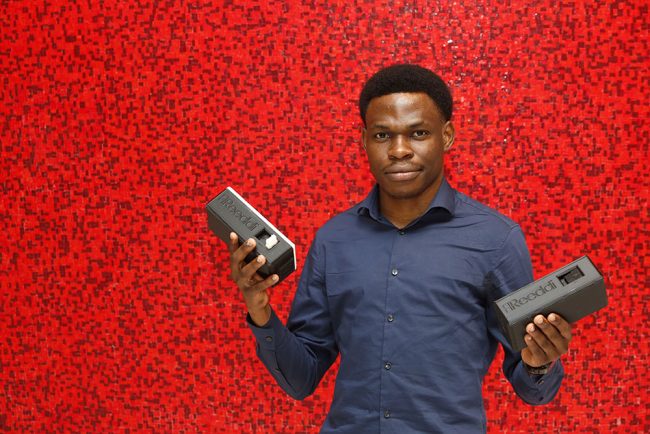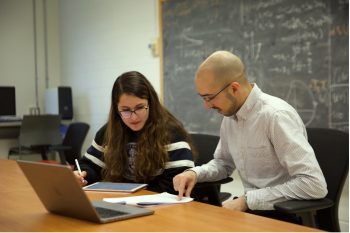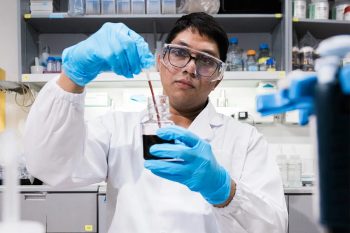A hearty “Yah!” accompanied by a fist-pump of victory, is what Olugbenga Olubanjo (CivE MASc candidate) remembers best about Victoria Day.
While the rest of the country was enjoying an extra day off as part of the holiday long weekend, Olubanjo heard of his startup’s latest prize – an award of US$10,000 as a runner-up in the Cisco Global Problem Solver Challenge. This is the third award the startup has received in 2019, not to mention a provisional patent.
Olubanjo and his team at Reeddi Inc (pronounced “ready”) want to bring clean, affordable and portable power to the people of Nigeria, giving them autonomy over their otherwise expensive and unpredictable energy grid.
The seeds of Reeddi were sown in 2017 while Olubanjo was in Toronto. He experienced the frustration of often being suddenly disconnected while talking to friends or family back home by phone. He would later usually find out the disconnection was the result of an all-too-frequent power outage.
Olubanjo recalls being “at Massey College at night with light everywhere,” and couldn’t imagine returning home where it was like “going back to darkness.” Growing up in Nigeria with sometimes only two hours of electricity a day, he set out to find a solution to a daily problem faced by many back home.
Some 600 million Africans live without access to electricity, with 70 million Nigerians among them. Alternatives for household lighting, cooking and other needs can be dangerous and expensive. Kerosene lanterns used inside create health risks, as well as the need to travel great distances to obtain costly fuel.
Vast amounts are spent on creating electricity from polluting sources, further adding to the poor air quality in Nigeria. The patchwork energy system is simply unreliable and dirty; a better way to serve the multitudes is still desperately needed.
Olubanjo’s initial idea was to create a solar “umbrella” capable of charging mobile phones, but after discussion with friends and engineering colleagues he began to envision something on a larger scale.

With the current project proposal, a large standalone, solar-powered structure, about half the size of a bus shelter, would have interactive screens at eye-level that control the user experience and provide access to the removable Reeddi Capsules. Each watertight Reeddi Capsule, about the size of a long 12-pack of soft drinks, is comprised of an internal rechargeable lithium-ion battery (LIB) with external USB and AC plug.
Customers would pay a nominal rent of up to US$0.50 per 24 hours for a 250 watt-hour (Wh) capsule. A standard 250Wh capsule is enough to provide a combined seven hours of lighting via two 150 lumen LED bulbs, fully charge three mobile phones (3W) and provide four hours of laptop power (30W). Capsules can also be connected and scaled up in a modular fashion; doubled-up it would create a 500Wh unit, and so on, for greater power needs such as appliances.
The capsule(s) can be returned within the rental period, or when depleted before the return period. As an incentive, when a return is made on time the customer is awarded points to be used towards future exchanges .
“The impact it can bring really drives me and makes me excited,” said Olu. The very clean, affordable and dependable power would give households stability of their power needs, as well as provide scalable options.
As proof of concept, Reeddi created a mock-up prototype of one capsule in December 2018, then created a working prototype for a capsule as a contest entry. They are on track to running a micro-scaled pilot with five Interactive working Reeddi Capsules prototypes by August 2019 in Nigeria.
Since January 2019, Reeddi has been internationally recognized for its innovative technology and business model. In February 2019, it won the North American Regional Award for the Best Emerging Startups in Decentralised Energy Track at the IEEE Empower a Billion Lives Challenge held at Georgia Tech, and in April, Reeddi Inc was the MIT 2019 Clean Energy Prize (National Grid Energy Delivery Track).
Olubanjo is clear he’s had a lot of help with the project. Ideas, prompts, expertise and questions from friends, colleagues and faculty led to the development of the project so far. He also benefitted from U of T Engineering’s Hatchery NEST. program, which provided 3D printing, acute business questions and more collaboration. Prof. Yu-Ling Cheng (ChemE, CGEN) acted as advisor and mentor along with Bill Nussey (CEO of Solar Inventions); Prof. Ireh Iyioha, Founder of PEIFFUND; Omozaphue Akalumhe, Director Prividia Energy UK; M.K Balaji of Delloite, and Okide Ezigbo of Ontario Power Generation. The team at Reeddi includes U of T’s Osarieme Osakue (CivE MEng Candidate) as Director of Communications and Joshua Dzakah (MechE 1T9) at the post of Mechanical Engineer, along with Olamide Oladeji as Director of Strategy & Analytics, Olatunji Oladipo and Azeez Oluwafemi.
Olubanjo acknowledges that the project has led to a “lot of sleepless nights.” But he adds: “what kept me going was the possibility of having an impact on millions of lives.”



